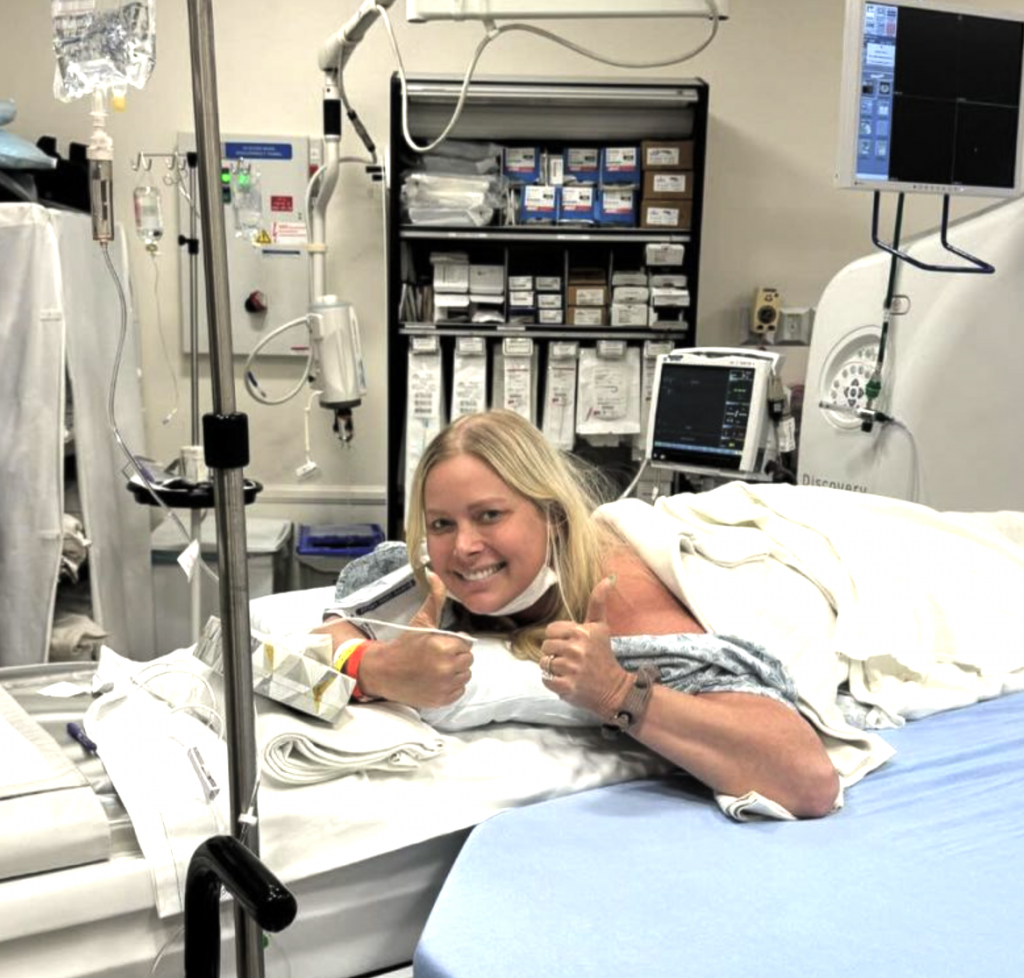Faith in Medicine
- Country Ever After star Criscilla Anderson says she is embarking on a new phase of her health journey by participating in a clinical trial in hopes of controlling or eradicating her disease as she continues her stage 4 battle with colon cancer. Clinical trials are particularly important when standard treatment is not working or when tumors have metastasized or spread to other organs. Phase I trials are typically the first that involve people.
- The Dallas-based dance choreographer, who is married to singer Coffey Anderson, shares 4 kids with the country star, and has been tirelessly advocating for her health since her 2018 diagnosis. Colon cancer, or colorectal cancer, is a type of cancer that affects your large intestine (colon) or the end of your intestine (rectum).
- Most colon cancers can be prevented if people are regularly screened. The screening usually involves a colonoscopy, in which a long, thin tube attached to a camera is used to examine the colon and rectum. Screenings are recommended beginning at age 45.
“Well today I embark on a new journey,” Criscilla wrote within her Wednesday update on Instagram. “I’m the 4th patient on a phase 1 clinical trial. I will spend the next six weeks going back & forth to California while trying to be home in Texas as often as possible. And then every 3rd week I’ll be in Cali until the trial ends.”
Read More
“For those that don’t know I’ve been flying to California every other week for the past 20 months. Needless to say the traveling gets old but I’m in the absolute best care over here at City of Hope. The cancer is currently in my lungs, my liver (recently surgically removed) and peritoneal abdominal cavity (lower back) – let us pray that this trial not only shrinks the cancer but that God gives a miracle and dissolves this disease completely.”
“I have so much life to live and I want to watch my babies grow up. And grow old with my husband. They deserve that. So here we are,” Criscilla added.
“Sometimes in life…we r given no other option but to trust God,” she initially began the share, expressing how she finds “value each day more than the average person” after six years of living with this disease. “I know what really matters in life. Simple moments are the most precious. Being there for each other is most important.”
Criscilla Anderson’s Colon Cancer Journey
Three years after Criscilla’s initial stage 4 diagnosis in 2018, she remarkably showed no evidence of disease (NED) in 2021, but the cancer unfortunately came back in early 2022.
With stage 4 cancer colon cancer, it is not curable, but is possible to manage it as a disease. The goal is to improve the quality of life as much as possible while keeping the cancer at bay. Stage 4 colon cancer means the cancer has spread beyond the colon and onto other parts of the body.
Ever since her diagnosis, Criscilla has warmed the hearts of fans with her high energy and zest for life as she juggles mom duties, following her dreams and supporting her husband’s endeavors — all while living with this unfair disease. The spirited dancer and actress has coached and performed with the Dallas Cowboy Cheerleaders amid her chemotherapy treatments, and performed with the legendary Dolly Parton and country star Keith Urban at the 2023 American Country Music Awards.
Evidently headstrong, Criscilla is the definition of someone who will never give up on living life to the fullest while trying to overcome her disease.

The most important thing to remember regarding hearing statistics such as this is that each patient is different, and there is a potential for cure in every stage of disease.
There are multiple treatment options available for patients with stage four disease which include both surgical and non-surgical options depending on patient factors, including location and extent of disease and performance status.
With the development of new therapies for metastatic colorectal cancer, there have been improvements in survival. Many of these treatment options involve a multidisciplinary approach, and should be tailored to the individual patient depending on the location and the extent of metastatic disease.
Learning About Clinical Trials
Researchers use clinical trials to test new strategies, treatments or devices to find out if they are safe and effective. Clinical trials may be appropriate for some people depending on a variety of factors, such as the stage and type of disease, and it’s always worth checking with your oncologist to see whether you are eligible.
RELATED: SurvivorNet’s Guide to Clinical Trials: What Are They and Are They Right for You?
Considerations include the specific characteristics and stage of your cancer and your medical history (including past treatments for cancer), as well as the potential risks and benefits of this trial in your specific case. The National Cancer Institute lists all cancer trials here.
Clinical trials for colorectal cancer can offer cutting-edge treatment
Colorectal surgeon Dr. Heather Yeo, a medical advisor to SurvivorNet, tells us while clinical trials can be fantastic opportunities to get specialized treatment, you can always choose to decline if you prefer not to participate. If you’re offered participation, the risks and benefits of the particular medication will be explained to you in detail and you may have to go to additional check-ups while you are receiving the medication to make sure everything is okay.
In a previous interview with SurvivorNet, oncologist Dr. Leena Gandhi, an immuno-oncology pioneer and chief medical officer at NextPoint Therapeutics, formerly of Dana-Farber Institute, also explained discussing clinical trials with her patients and encouraged speaking with your own doctor about your options.
“Ideally, your doctor should be able to give you information about what he or she thinks is a good potential clinical trial option,” Dr. Gandhi said, noting that your doctor should also help “navigate options that you come in with.”
Understanding Informed Consent
The informed consent process for a clinical trial will usually involve the research team presenting you with both standard consent forms as well as any other relevant information you may need about the treatments to know whether you wish to begin a clinical trial or stay in one if you’re already enrolled.
Before you enroll in a trial, you must be given the opportunity to read the consent documents fully and to ask any questions you may have. The documents will likely contain the following:
- The purpose of the research
- Any risks and benefits expected from the research
- Information about procedures that may cause discomfort (like frequent blood tests)
- Any alternative procedures the patient might consider instead
- How the patient’s information will be kept private
- How long the study is expected to take
- A form confirming you are participating in research voluntarily
- Whether any compensation or additional medical care is available if some sort of injury occurs
- Patients’ rights (such as the right to stop research in the middle of the trial)
- Contacts for any patient questions
During the time that you are participating in a clinical trial, the researchers may also make new discoveries that could affect you and how you’re being treated. At this point, they may ask you to sign a new consent form or you may decide you no longer want to be a part of the trial. Patients are allowed to walk away at any time during the trial.
Understanding your rights as a voluntary patient is important before you take part in a clinical trial, and understanding that the treatment may not work is crucial as well.
Do You Have to Pay for a Clinical Trial?
Most of the time, when a person takes part in a clinical trial, the study’s sponsor pays for the treatment and any additional care (like extra doctor visits) that may be required during the trial. Some sponsors even pay for travel to and from appointments or treatment centers. Patients should make sure they ask what exactly will be paid for before signing up to be part of a trial.
The Affordable Care Act also mandates that health insurance companies pay for routine patient care costs while people are enrolled in clinical trials. This means that any care that would normally be covered for a cancer patient is still paid for throughout the trial, according to the American Cancer Society.
Screening for Colon Cancer
When it comes to colon cancer prevention, screening is extremely important. Most colon cancers can actually be prevented if people are regularly screened. In fact, the incidence of colon cancer in the United States has been going down over the past two decades, and much of that reduction is thought to be due to screening.
If you’re at average risk, meaning you don’t have risk factors like smoking or a family history, the American Cancer Society advises getting regular colonoscopies once you turn 45. Colonoscopy is a test that uses a long, thin tube attached to a camera, which lets your doctor check for polyps throughout your whole colon and rectum. You’ll get one colonoscopy that will serve as a baseline, and, if your doctor doesn’t find any polyps, you’ll have another one in 10 years.
If you are diagnosed and treated for colon cancer, it is important to continue to follow up with your doctor after treatment, even if your cancer is considered cured, to make sure that it doesn’t come back.
Managing late-stage colon cancer
Learn more about SurvivorNet's rigorous medical review process.

